|
|
|
Sort Order |
|
|
|
Items / Page
|
|
|
|
|
|
|
| Srl | Item |
| 1 |
ID:
153878
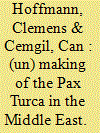

|
|
|
|
|
| Summary/Abstract |
Turkey’s foreign policy activism has received mixed reviews. Some feel threatened by the alleged increasing Islamization of the country’s foreign policy, sometimes called ‘neo-Ottomanism’, which is seen as a significant revision of Turkey’s traditional transatlanticism. Others see Turkey as a stable democratic role model in a troubled region. This debate on Turkish foreign policy (TFP) remains dominated by a sense of confusion about what appear to be stark contradictions that are difficult to make sense of. Intervening in this debate, this article will develop an alternative perspective to existing accounts of Turkey’s new foreign policy. Offering a historical sociological approach to foreign policy analysis, it locates recent transformations in Turkey’s broader strategies of social reproduction. It subsequently argues that, contrary to claims about Turkey’s ‘axis shift‘, its changing foreign policies have in fact never been pro-Western or pro-American. All foreign policy ‘shifts’ and ‘inconsistencies’, we argue, are explicable in terms of historically changing strategies of social reproduction of the Ottoman and Turkish states responding to changing domestic and international conditions.
|
|
|
|
|
|
|
|
|
|
|
|
|
|
|
|
| 2 |
ID:
161053


|
|
|
|
|
| Summary/Abstract |
The paper studies the “Turkish model” in a comparative historical perspective from three angles: as an example of mobilization modernization; as a combination of liberal democracy and Islam; and as a de-Westernization paradigm. The focus is on the transformation of the “Turkish model” and its substantive evolution from the early 1990s to the middle of the 2010s, and on how peaks of international interest in the “Turkish model” impacted Ankara’s foreign policy activities and its positioning on the international stage by Turkish elites. This approach helped to identify the factors behind periodic resurgence and transformation of the “Turkish model” and the shifting balance between the expectations of its potential recipients and Ankara’s plans to use it as a foreign-policy tool. Research methodology is based on the theory of multiple modernities and the concept of symbolic interactionism in international relations. In the case of Turkey, this approach provides broader possibilities for interpreting Ankara’s foreign-policy strategies and understanding the mechanisms of its relations with other countries in the Greater Middle East.
|
|
|
|
|
|
|
|
|
|
|
|
|
|
|
|
| 3 |
ID:
122047
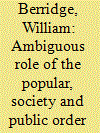

|
|
|
|
|
| Publication |
2013.
|
| Summary/Abstract |
This article addresses a number of obscurities surrounding the role of the various Sudanese police units often referred to as the 'religious police' or 'morality police'. These include the Popular Police, Society Police and Public Order Police. Although these units have often been analysed as agents of 'Arabization', 'Islamization' and the cultural domination of peripheral groups by the hegemonic northern riverain faction within the state, this article focuses instead primarily on the intra-northern debate over these units, which is suggestive of a variety of internal crises the northern government will need to resolve in the wake of secession. It contends that the Sudanese government has never resolved the ambiguity over whether these units function as local crime fighters or as guardians of religious morality. Although a number of analysts argue that the Sudanese regime has become less ideological and thus scaled back the morality police, this ambiguity remains highly relevant today, to the extent that it causes divisions within the security forces and even the government itself. The article further identifies the centrality of the debate over the public order units to the period of self-questioning that has characterized the 'post-Islamist' phase in Sudanese politics. It discusses the ambiguous social status of these units, who have been represented as guardians of urban Sudanese culture by their champions and a threat to it by their detractors.
|
|
|
|
|
|
|
|
|
|
|
|
|
|
|
|
| 4 |
ID:
075916
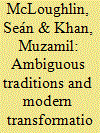

|
|
|
|
|
| Publication |
2006.
|
| Summary/Abstract |
Against current debates about the gradual 'Islamisation' of South Asia by Sufi cults, and the shifting ambiguity and fixity of religious boundaries in colonial India, this article is an account of the cult of the Qadiriyya-Qalandariyya saints in the Mirpur district of Pakistan-administered Kashmir. Mirpur is perhaps best known in Pakistan for its diaspora, especially in the United Kingdom where there is a significant literature on the cultural and economic dimensions of that now longstanding presence. However, there is still little specific or detailed ethnography of homeland traditions of Mirpuri religiosity. Based upon research in Mirpur and Britain, this article is an original attempt to fill this significant gap. It focuses on the cult of two 'intoxicated' Sufi saints at Kharri Sharif, the most significant shrine complex in the region, and makes use of textual sources of sacred biography and romantic poetry, as well as first-hand participant observation. In this regard we follow Werbner and Basu (1998) who view Sufi Islam as 'a single, total, symbolic reality'. We also adopt their innovative agenda for study of 'the connections [and, we suggest, the possible disconnections] between Sufi cosmologies, ethical ideas, bodily ritual practices and organisational forms'. Ultimately, it is argued that the Qadiriyya-Qalandariyya cult is presently waning, having produced no living saint to act as ethical guide since the beginning of the twentieth century. Moreover, while the popularity of demotic ritual embodying a Sufi cosmology continues unabated in Mirpur, since Partition a neo-orthodox epistemology has (rather belatedly) begun to transform dominant socio-religious discourses in the region. Indeed, Kharri Sharif and the income from its offerings have also come under the control of the ministry of awqaf (pious endowments). Thus, the Qadiriyya-Qalandariyya cult appears to lack both the charismatic leadership and organisational autonomy that has allowed other Sufi cults to imagine 'spaces of potential freedom' beyond the stranglehold of the postcolonial state.
|
|
|
|
|
|
|
|
|
|
|
|
|
|
|
|
| 5 |
ID:
056596
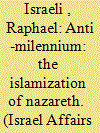

|
|
|
| 6 |
ID:
106787
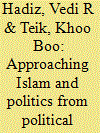

|
|
|
|
|
| Publication |
2011.
|
| Summary/Abstract |
The article traces the trajectories of Islamic politics in Indonesia and Malaysia in relation to the changing political economy of these two countries. The approach adopted is to understand Islamic politics less on the basis of Islamic doctrine, or conflicts over its interpretation, than in connection with the changing social bases of politics, the context established by capitalist economic transformations, the evolution of the post-colonial state from the Cold War and its aftermath, and of crises of political economy in the 1980s and 1990s. The exercise reveals important convergences and divergences in trajectories that help to explain the complex historical processes which have shaped Islamic politics in these two cases and possibly beyond. It also reveals the entanglement of Islamic politics in very profane conflicts over power and tangible economic resources over time. In both countries a new form of Islamic populism has emerged as a major articulator of grievances against the secular state and perceived social injustices. However, the same historical processes have enabled the social agents of Islamic politics in Malaysia to contest state power more effectively than their counterparts in Indonesia.
|
|
|
|
|
|
|
|
|
|
|
|
|
|
|
|
| 7 |
ID:
111597
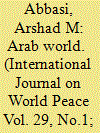

|
|
|
| 8 |
ID:
103850
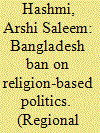

|
|
|
| 9 |
ID:
181649
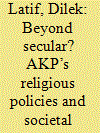

|
|
|
|
|
| Summary/Abstract |
This article addresses the religious policies of Turkey’s Justice and Development Party (AKP) targeted at promoting Islam among the Turkish Cypriot community. For the secular circles of the Turkish Cypriot community, the AKP’s imposed religious policies constitute a threat to its fundamental features and social fabric. Islamisation policies are regarded as cultural imperialism of the AKP government, with the aim of generating a religious youth, a conservative mentality, and more widespread religious practice in North Cyprus. Within this context, this article analyzes the historical account of the secularization experience of the Turkish Cypriot community, the politicization of religion with reference to education, and the penetration of AKP’s religious policies in North Cyprus.
|
|
|
|
|
|
|
|
|
|
|
|
|
|
|
|
| 10 |
ID:
187447
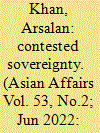

|
|
|
|
|
| Summary/Abstract |
Pakistan has witnessed the rise of a range of Islamic forces that claim to be defending Islam from what they imagine to be a deluge of incidents of blasphemy, a veritable moral panic organized around a set of blasphemy laws pertaining to the regulation and protection of Islam. The violence of blasphemy politics, which is disproportionately directed at sectarian and religious minorities, is predicated on the claim that is the duty and mandate of the state to enforce the blasphemy laws, and where the state fails, the onus falls on ordinary Muslims to fulfill the demands of Islam. In this article, I focus on the response to this blasphemy politics by Pakistani Tablighis, practitioners of the transnational Islamic piety movement the Tablighi Jamaat. Like other Islamic groups in Pakistan, Tablighis consider blasphemy to be a grave sin and a deep threat to the Islamic community, but Tablighis believe that the solution to the growing incidence of blasphemy is to spread virtue through their distinct form of face-to-face preaching (dawat). I show that these different ethical responses to blasphemy reflect different approaches to the relationship between Islam and state sovereignty. Specifically, I argue that blasphemy politics presupposes the sacralization of the state but Islamic piety among Pakistani Tablighis provides an alternative ethical framework for addressing the moral injury of blasphemy.
|
|
|
|
|
|
|
|
|
|
|
|
|
|
|
|
| 11 |
ID:
157950
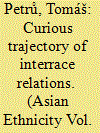

|
|
|
|
|
| Summary/Abstract |
This article aims to examine several interrelated issues pertaining to the historical development of pluralism in areas forming today´s Malaysia. Firstly, it intends to analyze the transformation of the formerly cosmopolitan populations of Malay port polities into the highly ‘racialized’ society of modern Malaysia. It also seeks to clarify the roots of ethnicity-based issues and relations in the country. Lastly, it attempts to challenge the very concept of Malaysia as a society primarily consisting of three ethnic pillars, dominated by the Malays, and ‘complemented’ by the Chinese and the Indians. I argue that the main driving force behind these tensions is the segregational colonial policies and the postcolonial arrangements of the Malay ethnocentrist governments, rather than ethnic and cultural factors as the ruling politicians tend to stress. I also contend that religious issues, especially those stemming from the dakwah movement, are gradually becoming an increasingly important factor in interrace strife.
|
|
|
|
|
|
|
|
|
|
|
|
|
|
|
|
| 12 |
ID:
099525
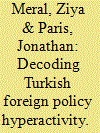

|
|
|
| 13 |
ID:
146536


|
|
|
|
|
| Summary/Abstract |
The democratization of politics has been accompanied by a rise of Islamic laws in many Muslim-majority countries. Despite a growing interest in the phenomenon, the Islamization of politics in democratizing Muslim-majority countries is rarely understood as a process that unfolds across space and time. Based on an original dataset established during years of field research in Indonesia, this article analyzes the spread of shari’a regulations across the world’s largest Muslim-majority democracy since 1998. The article shows that shari’a regulations in Indonesia diffused unevenly across space and time. Explanations put forward in the literature on the diffusion of morality policies in other countries such as geographic proximity, institutions, intergovernmental relations and economic conditions did not explain the patterns in the diffusion of shari’a regulations in Indonesia well. Instead, shari’a regulations in Indonesia were most likely to spread across jurisdictions where local Islamist groups situated outside the party system had an established presence. In short, the Islamization of politics was highly contingent on local conditions. Future research will need to pay more attention to local Islamist activists and networks situated outside formal politics as potential causes for the diffusion of shari’a law in democratizing Muslim-majority countries.
|
|
|
|
|
|
|
|
|
|
|
|
|
|
|
|
| 14 |
ID:
132036
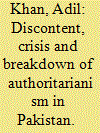

|
|
|
| 15 |
ID:
095678
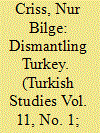

|
|
|
|
|
| Publication |
2010.
|
| Summary/Abstract |
The Islamization of Turkey has been an ongoing process since the 1970s and was exacerbated by the 1980 military coup. The Turkish-Islamic synthesis had been conceived as an antidote against communism and became a salient policy. The atmosphere became increasingly convenient for Islamists to participate in politics as well as in socioeconomic forums. The ruling AKP defines itself as conservative democratic. Tariqats have been educating young cadres to fulfill the Islamization mission. Prime Minister Erdo an monopolizes foreign relations, which result in diplomatic scandals and cause people to ask whether Turkey is changing direction. Counterbalancing forces remain confrontational. Paradigm shifts in practicing politics are sorely needed.
|
|
|
|
|
|
|
|
|
|
|
|
|
|
|
|
| 16 |
ID:
187047
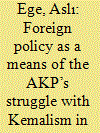

|
|
|
|
|
| Summary/Abstract |
This article provides analyses as to how foreign policy affects domestic politics, in particular the AKP’s struggle with Kemalism. It examines how Kemalism was delegitimized through the initial democratic, pro-European Union and pro-West discourse of the AKP. It then analyzes Kemalism’s marginalization under the civilizational, neo-Ottoman discourse advanced by Ahmet Davutoğlu. Finally, it explores Kemalism’s alienation through the opposition CHP, which has been impacted by the neo-Ottoman discourse, as currently constructed. It concludes that the AKP’s struggle with Kemalism did not end even when it established control over the state and when the ideological Kemalist nation-state identity was replaced by a new content in the form of an Ottoman-Islamic civilization. The article relies on a method of interpretative analysis of the AKP and Kemalist movements.
|
|
|
|
|
|
|
|
|
|
|
|
|
|
|
|
| 17 |
ID:
114026


|
|
|
|
|
| Publication |
2012.
|
| Summary/Abstract |
This essay interrogates popular beliefs about Islamization of the Pakistan Army officer corps and the polity from which the army recruits. It first assembles and synthesizes the extant secondary literature on Islamization of Pakistan generally, and the army in particular. As access to the Pakistan Army diminished after 1990 when numerous US sanctions on Pakistan limited defense cooperation and other forms of bilateral engagements, this secondary literature is generally truncated to 1990. To expand what is known about the Pakistan Army, this essay next presents the results of an ongoing quantitative analysis of district-level officer recruitment (and retirement) data. This ecological study finds that, as recently as 2002, districts that produce army officers are actually more socially liberal and urban than is commonly believed. This essay discusses the implications of the changes in the officer corps and concludes with a call for a robust research agenda on the Pakistan Army.
|
|
|
|
|
|
|
|
|
|
|
|
|
|
|
|
| 18 |
ID:
061818
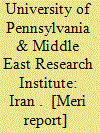

|
|
|
|
|
| Publication |
London, Croom Helm, 1985.
|
| Description |
181p.pbk
|
| Standard Number |
0709935501
|
|
|
|
|
|
|
|
|
|
|
|
Copies: C:1/I:0,R:0,Q:0
Circulation
| Accession# | Call# | Current Location | Status | Policy | Location |
| 026342 | 955.054/UNI 026342 | Main | On Shelf | General | |
|
|
|
|
| 19 |
ID:
048256
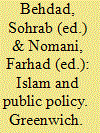

|
|
|
|
|
| Publication |
Greenwich, JAI Press, 1997.
|
| Description |
xii, 310p.
|
| Series |
International review of contemporary public policy. v. 9
|
| Standard Number |
076230268
|
|
|
|
|
|
|
|
|
|
|
|
Copies: C:1/I:0,R:0,Q:0
Circulation
| Accession# | Call# | Current Location | Status | Policy | Location |
| 042660 | 320.607/BEH 042660 | Main | On Shelf | General | |
|
|
|
|
| 20 |
ID:
109050
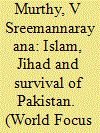

|
|
|
|
|
|
|
|